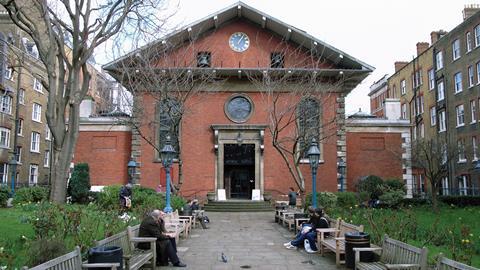Pleasantly ensconced at the heart of London, Michael Simmons’ practice is continuing to thrive. But then a letter brings bad news…
Working in Trafalgar Square was enjoyable. Somehow, everyone in the firm felt that we were at the very heart of London, with all its amenities readily available.

The layout of the old Grand Hotel was ideal for a legal practice. The rooms were light and airy, and I’d always felt that lawyers worked best in little boxes. Grand Buildings proved my thoughts correct, as productivity was increasing nicely.
I made yet another mistake in taking over a small firm. The sole principal talked a good game and his assistant solicitor fitted in nicely, as she was now able to concentrate on her preferred option of litigation.
As senior partner, the complaints always landed on my desk. I was receiving an ever increasing number in relation to LX’s work. There had been no time yet to exchange clients, so the complaints all related to clients he had brought with him. There was clearly a pattern of neglect here and I feared he was having some kind of breakdown.
One of the disadvantages of working in separate rooms was that we could not see what was going on in his. The problem had to be addressed, so I organised a group of us to pay him a visit.
With the benefit of hindsight, such an approach was bound to increase his paranoia, but what else could we do? As a firm offering services to clients, I had managed to get it across to everyone that failure to provide those services was a cardinal sin.
LX’s room was a horrible mess, with files stacked everywhere. He was still very much the generalist, even though he had expressed the view that joining us gave him the opportunity to specialise. With his agreement, we started going through his most urgent cases together. He clearly had too much to handle, so we took over certain files and distributed them accordingly. He accepted that this was for his own good as well as for the good of the clients.
The next morning, I arrived at work to discover that LX had come into the office overnight and taken back all his files. An unpleasant conversation followed and we mutually agreed to tear up our merger agreement and, as far as possible, restore things to the way they were before. LX was far happier running his own small enterprise, and I hoped that I’d now learned my lesson.
We had been in Grand Buildings for nearly four years when the bombshell letter arrived from Land Securities. They had decided to redevelop the building and they wanted us and all the other tenants to vacate.
I was well aware of the clause in our lease under which we would have to leave without notice or compensation. Yet I felt sick that I had not challenged the offending clause when the lease was still in draft form.
A sleepless night followed. I was on good terms with Ian H, their managing director, so I telephoned him. In our subsequent negotiations, neither of us ever referred to that particular clause. I wonder to this day whether he was aware of it or had decided to ignore it and behave as though it did not exist, even at the cost to his company of a considerable sum.
We walked away from Grand Buildings with a substantial six-figure amount. I was tempted to distribute it as a capital dividend among the partners. At that time, I still had a very substantial share of the equity and would have benefited disproportionally. However, I decided against this. The money was instead invested in gilt-edged securities and left in the firm as permanent capital, thus greatly strengthening our balance sheet.
We had to find somewhere to relocate the firm. There was a lot of unattractive stuff on the market and we eventually settled on a floor in Villiers House, a modern block near Charing Cross station, as the best of a bad lot. This was owned by Town & City, another massive property company.
The new draft lease had barely arrived when I received a phone call from someone in authority from Town & City. They desperately needed our floor at Villiers House to decant one of their tenants, so that they could proceed with another development. Would we accept compensation?
I thought about it overnight and decided that I did not like the idea of double-dealing with Land Securities. I phoned Ian H and explained the situation. ‘Double-deal away as much as you like. I’ve no problem with it.’
My difficulty was that the clock was ticking to the date when we had to vacate possession of Grand Buildings, albeit with a very generous period of notice. I cancelled all my appointments for that afternoon, scooped up a sheaf of agents’ particulars that I still had on my desk and started walking round London.
There was indeed a load of featureless rubbish on the market. After Grand Buildings, I felt that I wanted something with a bit of style and character. I was walking up Bedford Street in Covent Garden when I came upon a corner building in the early stages of redevelopment. It looked as if it had been built as an imposing residence in early Victorian times.
The side door was open, so I wandered in. Spread over four floors with the garden of St Paul’s Church at the back, which made it light and airy, this would make the ideal self-contained office building for us with plenty of room for future growth.
I had not thought before about a standalone home for us. But why not? It would give the firm a completely different and much improved character. I was able to track down the builders’ foreman and he gave me details of the developers. They were delighted to deal with us direct without the intervention of agents. Ian H was happy to extend our notice period to coincide with the date when the new building would be ready for our occupation.
Agreeing the rent was not difficult, as the developers recognised that I was saving them a lot of time and bother by walking in and taking the whole building. They even threw in an initial six months’ rent-free period when I asked for it.
Now the serious negotiations began. The building was a shell only and I wanted Town & City to pay for partitioning, carpeting and generally getting the place completely ready for the moment when we entered into occupation. But how far could I push them?
The answer was very far indeed. The interior was converted to our detailed specification at their cost. A shower room was installed in the basement exactly where I wanted it and a fully equipped kitchen went in beside the new boardroom. Change of address notices were sent out to all and sundry at their expense and a year’s supply of new stationery was also provided.
I negotiated with the church to allow us to put up a marquee for the inaugural party. The cost of the whole event, including posting invitations, was also to their account.
I lay awake at night wondering if I’d missed a trick and there was another cost that I could persuade Town & Country to assume.
And so the day came when we moved into Inigo House – 29 September 1982. Why it was named thus I don’t know, but I later discovered that in Victorian times the building had housed an earth closet company – earth closets then rivalling water closets.
How different things might have been! From the firm’s name in gold-leaf lettering on the plate glass front doors, the entire premises were designed to give the impression that this was a law firm ready to punch above its already considerable weight.
We had recently made up some new partners, including Alan T, a pugnacious New Zealander. At his first partners’ meeting, he lectured the others at length on just how lucky they were to have me as senior partner.
I sat there feigning embarrassment but secretly enjoyed every moment of it. I repaid his praise by making a long journey to the north of England to the headquarters of a national chain of shoe shops, a very important new client, to throw myself on their mercy. Alan T had failed to follow the correct procedures to renew the lease of their original shop in London, which allowed the landlords to hold the clients to ransom over the new rent. The trip was worthwhile, as I had the chairman’s words ringing in my ears for some time after: ‘Don’t do it again!’
Increasingly, while senior partner as the firm expanded, I had to assume the additional role of diplomat and solver of other people’s problems.
Despite the fact that we had moved into new premises, I could not help thinking that we were still largely the same firm, with the same lawyers, practising law in the same way as before, but now attracting clients and businesses which would not previously have deigned to instruct us.
We were riding high. What could possibly go wrong?
'The clients had made fools of us all, bankers and brokers included, but I felt that I should have done better'
The answer came in dual form on the same day. Our rent-free period was now over and the large rent demand gave much food for thought, as we would have to find the money to pay it quickly.
Simultaneously, the City Fraud Squad arrived on our doorstep in hot pursuit of my largest and most lucrative client, an Indian international trading group. The principals had fled the country, leaving me holding an extremely unpleasant baby.
The clients had made fools of us all, bankers and brokers included, but I felt that I should have done better. In general, my partners stood by me stoically, except for the aforesaid Alan T, my erstwhile champion. He was overheard commenting: ‘I think Michael should plead guilty and accept a short custodial sentence.’ His idol had proved to have feet of clay.
Needless to say, my only crime was stupidity. I received the ultimate accolade when the chief inspector in charge of the operation asked me to act for his girlfriend in a banking matter, with the words: ‘You seem to understand these things’.
Alan T did not stay long with us but went off to join the ranks of sole practitioners. I’m sorry that I did not live up to his high expectations. The fleeing clients, to their credit, paid us every penny we were owed and I learned the lesson that I was not as clever as I thought.
‘Oh Michael, you are our guru. What would we do without you?’ These were encouraging words and, coupled with invitations to fancy weddings in Bombay, all expenses paid, might mask activities which demanded further questioning.
Fortunately, nature abhors a vacuum. I was quickly able to gain new clients to fill the gap. We still had empty space and I was looking for a small firm to fill it.
CH & Co seemed ideal. They were a four-partner firm near Lincoln’s Inn with which I had dealt over the years. They had good institutional clients that we still did not have. The partners lacked the hunger which motivated us and seemed content to wait for their clients to instruct them.
Their senior partner had left in unexplained circumstances. I knew as part of my due diligence that I should track him down and find out why he had departed but something held me back. I wanted to do this deal and had no wish to hear anything which might make it less attractive. They were far less ambitious and dynamic than us.
Perhaps that was why they needed to be taken over.
































1 Reader's comment